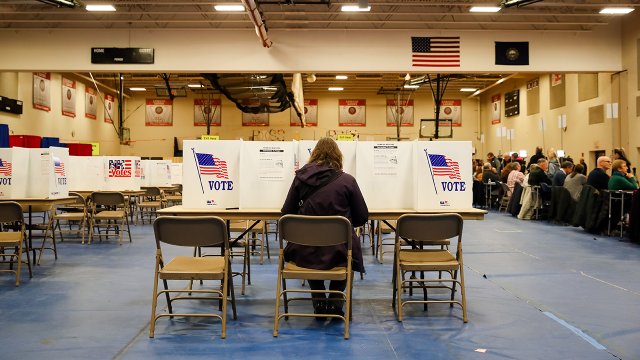
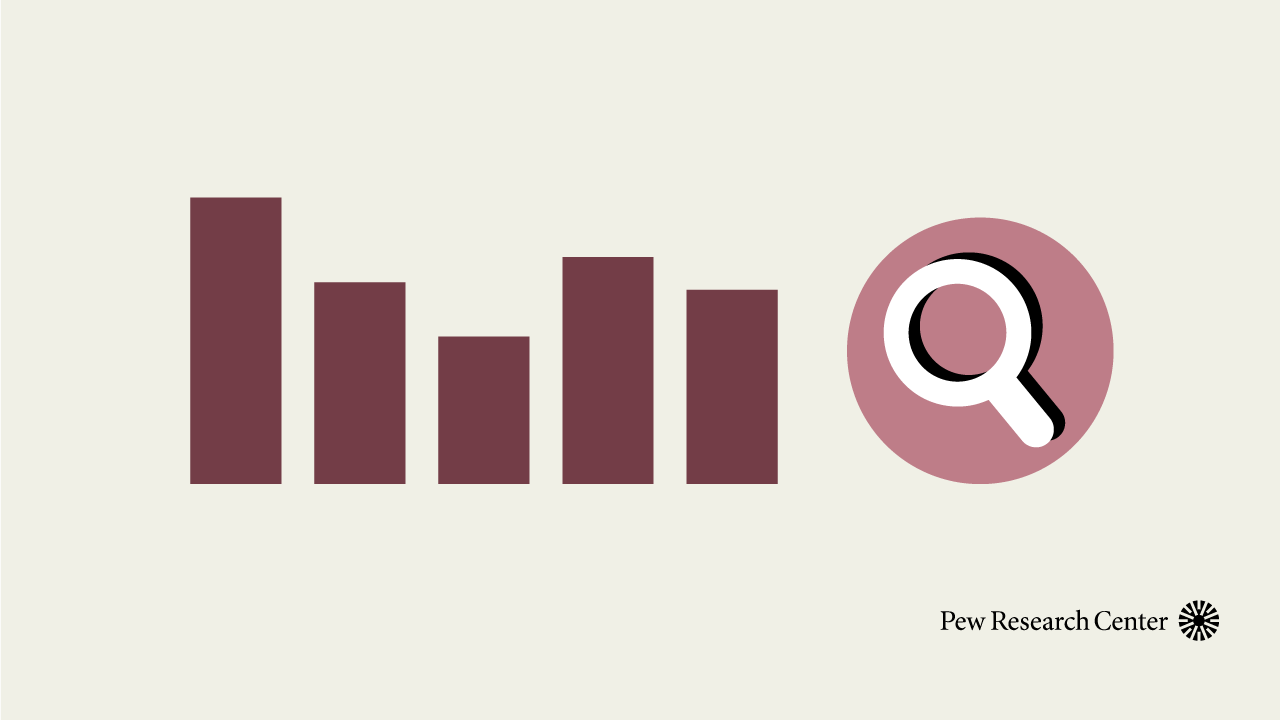
Want to see more data on these questions?
To analyze these survey questions by additional media habits and demographic characteristics, visit the interactive tool and access the dataset.
Last week’s caucus-tallying muddle in Iowa shined a spotlight on the way U.S. presidents are elected and on the possibility that, in a divided nation, there could be controversies over vote tallies, results and the legitimacy of the outcome.
Many political issues are highly polarized across partisan lines, but Americans’ confidence in the public’s willingness to accept election results regardless of who wins – a fundamental underpinning of our electoral system – is only modestly tied to party identification. Instead, it appears to have a closer relationship to how intensely U.S. adults engage with political and election news, according to a new analysis of data from Pew Research Center’s Election News Pathways project. The more closely someone follows political news, the more confidence that person has that election results will be accepted. And those differences cross party boundaries.
The findings are based on a survey of 12,043 U.S. adults who are members of the Center’s American Trends Panel conducted from Oct. 29 to Nov. 11, 2019.
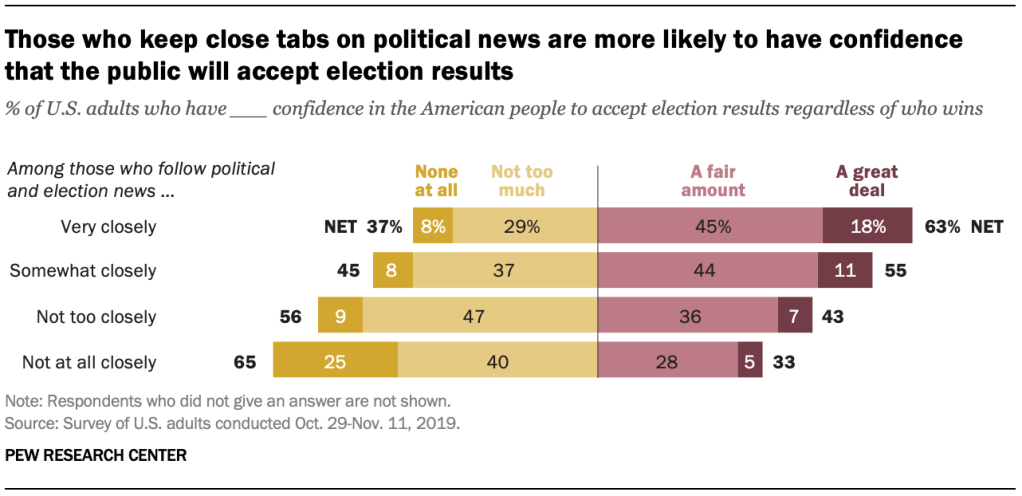
Reliance on social media for political news also appears to be a factor in someone’s confidence in the acceptance of election results. Americans who get most of their political news on social media display less confidence in the public’s acceptance of election results, regardless of the winner, than those who mostly get this news in other ways such as cable TV, news websites or print newspapers.
Political news engagement closely ties to confidence that election results will be accepted
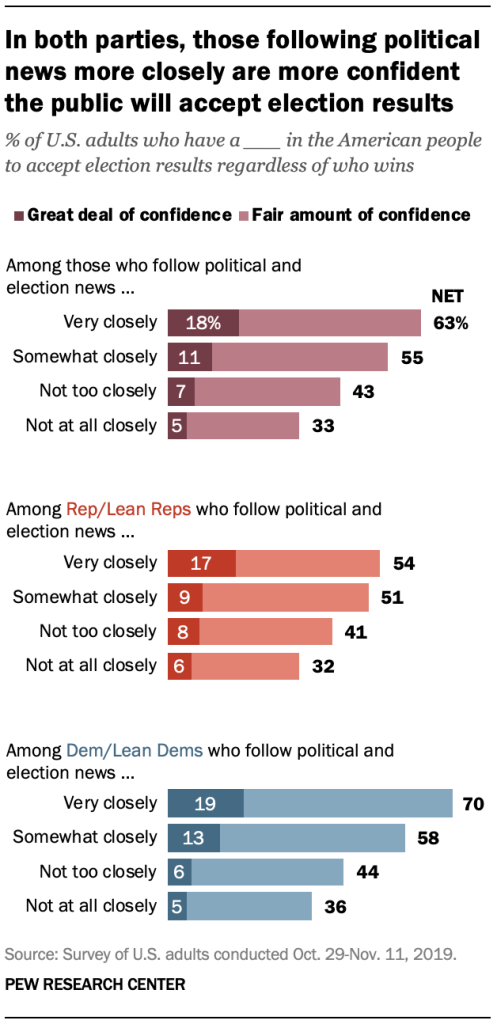
Greater attention to political and election news aligns with greater confidence in the public’s acceptance of election results – regardless of party.
At the high end, nearly two-thirds of U.S. adults who say they follow election news very closely (63%) say they have a great deal or fair amount of confidence. That number continues to drop as attention to political news lessens, bottoming out at 33% of those who do not follow election news closely at all. That divergence holds when examining just those who express a great deal of confidence. Roughly two-in-ten (18%) of those who follow election news very closely feel this way, compared with only 5% of those who follow it not at all closely.
There is a similar pattern within both parties. Seven-in-ten Democrats and Democratic-leaning independents who follow political news very closely say they have a great deal or a fair amount of confidence in the public’s willingness to accept election results, compared with about a third of Democrats (36%) who do not follow this type of news. Among Republicans and Republican leaners, roughly half of those who follow political news very closely (54%) or somewhat closely (51%) express this level of confidence, and both groups are more confident than Republicans who follow political news not at all closely (32%).
It is worth noting that there are modest partisan differences on this issue. Just over half of Democrats (56%) say they have a great deal or fair amount of confidence election results will be accepted, compared with 47% of Republicans. But the party difference is smaller than the difference among those who follow election news at different levels.
Those who get most of their political news on social media are less confident the public will accept election results
Americans’ confidence in the acceptance of election results also differs by the pathways they most commonly use for political and election news – specifically for those who rely most heavily on social media.
Adults who say the most common way they get political and election news is through social media express less confidence in the public to accept election results than those who get most of their election news via TV, print, radio or news websites and apps.
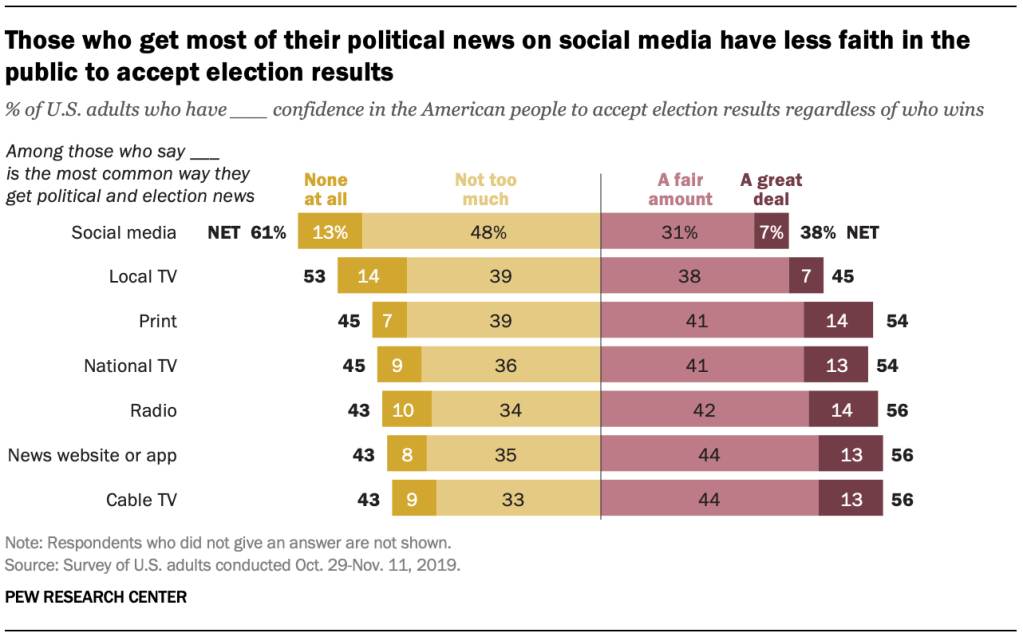
About four-in-ten U.S. adults who rely most on social media for political and election news (38%) say they have a great deal or fair amount of confidence in the public accepting election results.
Those who mostly use local TV for political news are second-lowest in their confidence, with 45% saying they have at least a fair amount. This rises to half or more among those who primarily get their political news from any of the other pathways asked about.
The gap between those who most commonly use social media for political news and those who use other media is particularly stark among Democrats: 38% of Democrats and Democratic leaners who tend to get political news on social media have at least a fair amount of confidence, compared with a 60% majority of Democrats who get most of their political news in other ways. This gap persists among the youngest Democrats as well. There is a similar but smaller gap among Republicans and Republican leaners (38% for social media vs. 48% for other pathways).
Interested in exploring the data further, seeing more data like this or conducting your own analysis? Visit our interactive data tool and access the dataset.
See the survey questions and methodology for this analysis.
Acknowledgments: The Election News Pathways project was made possible by The Pew Charitable Trusts. Pew Research Center is a subsidiary of The Pew Charitable Trusts, its primary funder. This initiative is a collaborative effort based on the input and analysis of a number of individuals and experts at Pew Research Center.




